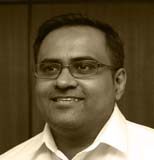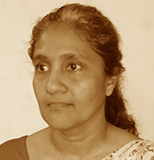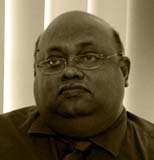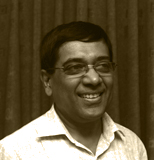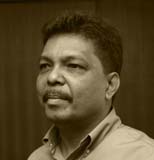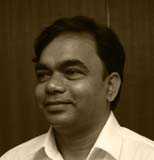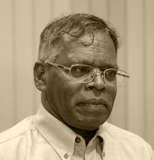- Balachandran Gnanasekaraiyer, Mr.Read More...
Mr. Balachandran Gnanasekaraiyer has been responsible for key developments in the arena of ICT in Local Languages. As a Consultant to the Information and Communication Technology Agency (ICTA) of Sri Lanka, in 2006 he commenced working on a Tamil keyboard layout to be standardized. He later worked on developing the draft Tamil ICT standard which encompassed the keyboard layout for Tamil with keying-in sequences, encoding for Tamil characters aligned to the Unicode standard and a Collation Sequence for Tamil. These were included in the draft standard which ICTA proposed to the Sri Lanka Standards Institution, which resulted in the Tamil ICT standard SLS 1326 : 2008.
Mr. Balachandran later transitioned to the area of cyber-security. He is a Certified Ethical Hacker and a certified Computer Hacking Forensic Investigator. Mr. Balachandran was the first employee of the Bank CSIRT. He is at present Head of Cyber-Security at Dialog Axiata.
Mr. Balachandran was awarded a Bachelor of Information Technology (Honors) degree from Charles Sturt University, Australia. His Master’s Degree included components of both ICT and language due to his interest in ICT and the Tamil language. The research for his degree comprised working on a scheme to transliterate names in Tamil to names in Sinhala.
- Dineesha Ediriweera, Ms.
Read More...Ms. Dineesha Ediriweera is at present a Senior System Engineer at Associated Newspapers of Ceylon Ltd. (ANCL). She has a B.Sc. and a M.Sc. in Computer Science and Engineering, both from the University of Moratuwa, Sri Lanka. She is also a Corporate Member of the Institute of Engineers of Sri Lanka (IESL) and a Corporate Member of the Computer Society of Sri Lanka (CSSL).
Ms. Ediriweera designed and developed software for the classified advertisement system and the digital advertisement system of ANCL. She also designed and developed software for the Sinhala Collation Algorithm for the classified advertisement system and the Sinhala Hyphenation Module for the Editorial System. She has developed software for conversion from non-Unicode to Unicode and proprietary to open systems. She also developed the rules for the ANCL Unicode font Dinamina under the guidance of Mr. Anura Tissera. This font was subsequently handed over to ICTA to be used freely.
Ms. Dineesha Ediriweera has been an active member of the Local Languages Working Group (LLWG) of the ICT Agency of Sri Lanka (ICTA) for the past 8 years. Ms. Ediriweera in developed the rules of the ICTA Unicode compliant Sinhala font Bhashitha and completed it with the glyphs which were designed by Mr. Pemasiri. The font was named “Bhashitha” as suggested by Ms. Ediriweera. This aesthetically correct Sinhala font Bhashitha was developed at three levels and each level comprised a font family with serif and sans serif fonts with bold and regular for each font. Mozilla Firefox requested this font and a lighter version, BhashithaScreen, was therefore released to Mozilla Firefox. Ms. Ediriweera also applied the font rules for the font Hodipotha which was developed for ICTA and was meant for teaching small children.
Ms. Dineesha Ediriweera states that Sinhala has a wonderful structure in the roots of words and in the forms of grammar and she intends to analyze the structures to make these available for localization software.
- Harsha Wijayawardhana, Mr.
Read More...Mr. Harsha Wijayawardhana is the Chief Operating Officer of Theekshana (a company managed by the University of Colombo School of Computing, UCSC) and is also the Director/CEO of a nascent company on Internet of Things (IoT) in Sri Lanka. Mr. Harsha Wijayawardhana who is an alumnus of the University of Miami, USA has more than 25 years of experience in ICT. Mr. Wijayawardhana is a Fellow of the British Computer Society. He was also involved in developing the Software Development Unit (SDU) of the UCSC. He and his team at SDU have been an integral part of developing software for the Government of Sri Lanka.
He has contributed immensely to the development of the Internet and e-Governance in Sri Lanka. He was a member of the Internet Committee of the Council for Information Technology (CINTEC). This is where the very first work on implementation of Sinhala Unicode began. Mr. Wijayawardhana has been an ardent advocate of Sinhala Unicode and has developed Sinhala Unicode compliant fonts in his lab. He is a member the Local Language Working Group of the ICT Agency of Sri Lanka (ICTA) and is a member of the Sectoral Committee on ICT of the Sri Lanka Standards Institution (SLSI). Mr. Harsha Wijayawardhana was also the Founder President of the local chapter of Internet Society (ISOC-LK). He has served on the Board of LK Domain Registry since its inception. He was recognized as an Internet Pioneer at the celebration on 20 years’ of connecting Sri Lanka to commercial Internet, by ISOC, the LK Doman Registry and ICTA, in 2015.
- Pushpananda Ekanayaka, Mr.
Read More...Mr. Pushpananda Ekanayaka has been designing letters of the Sinhala script, in different shapes from the time he was a young child. The first Sinhala font Mr. Ekanayaka designed was Malithi. In 1998, Mr. Ekanayaka released 10 fonts which he had developed, but these did not include a text typeface font. There was a necessity for a text font and consequently Mr. Ekanayake designed the hugely popular Sinhala ASCII font FM Abhaya. Thereafter, it was necessary to design and develop Sinhala fonts of various styles intended for different purposes. Consequently, he designed and developed 12 Sinhala fonts of different designs.
Mr. Ekanayake later developed fonts compliant to the international encoding standard Unicode. One such font that he designed is the MalithiWeb, a light font mainly intended to be used in websites. Mr. Ekanayaka gave this font to ICTA, to be given freely to users. Mr. Ekanayaka set up the Company “The FontMaster”, through which he continued to design and develop Sinhala fonts. Mr. Ekanayaka explains that publishing software not fully supporting Sinhala is an impediment, especially towards adherence to the Unicode standard.
- Rohan Manamudali, Mr.
Read More...Mr. Rohan Manamudali, together with Mr. Sampath Godamunne co-founded Science Land Corporation (Pvt) Ltd, in 1994 a Company solely dedicated to local language computing. Mr. Manamudali and Mr. Samapth Godamunne were co-developers tri-lingual word processor “THIBUS”, which made a huge impact on local language computing in Sri Lanka. This was a time when many people were reluctant to use computers due to not being conversant in English. Language was a huge impediment in getting people to use computers in Sri Lanka. “Thibus” filled this gap, and people were able to use word processors in Sinhala. Rohan Manamudali is a graduate of the University of Moratuwa.
Rohan Manamudali’s first introduction to computers was when as a schoolboy, he first saw the Sinclair computer at his school, Harischandra Maha Vidyalaya. In 1987, Universities were closed with no opening date in sight and Rohan could not enter the University as scheduled, in 1987. Rohan Manamudali and friends, Dhammika Wijeratne, Sampath Godamuune and later Vipula Jayampathy worked on local language computing, assembled a computer and tried to make the computer work in Sinhala, learning from books.
In 1995, Science Land developed a keyboard driver which worked on Windows and also several Sinhala and Tamil fonts. In 1997 they developed a Sinhala spell checker and a sorting system. In the year 2000, Mr. Rohan Manamudali states that they developed, what he believes was the first Sinhala electronic dictionary. This was called “Thibus word translator”. They developed Sinhala software for the local market. In 2006/2007 the team developed Sinhala text message software for mobile devices, and also Sinhala / Tamil dictionary software for mobiles.
In 2005, the Information and Communication Technology Agency (ICTA) of Sri Lanka was promoting adherence to the international standard Unicode. They therefore converted the Thibus package to be Unicode compliant.
Science Land also developed a six-way transliteration system for Sinhala, Tamil and English, for ICTA. Science Land signed another contract with ICTA, to localize the user interfaces of Windows Vista and MS Office 2007, and later to localize the user interfaces of Windows 7 and MS Office 2010. This work was carried out by a joint venture between Science Land and the University of Colombo School of Computing (UCSC). In addition, Science Land had also developed a Financial Management and Reporting System for ICTA.
- Ruvan Weerasinghe, Dr.
Read More...Dr. Ruvan Weerasinghe has a first degree in Mathematics and Statistics from the University of Colombo, Sri Lanka. He ventured into the field of IT and Computer Science through postgraduate study in the UK. Since then Dr. Weerasinghe has been involved in many facets of the ICT industry. He started with small scale projects and feasibility studies for State Sector organizations.
Dr. Ruvan Weerasinghe has been part of the pioneering bodies which were instrumental in the introduction of the Internet to Sri Lanka; through both the Lanka Educational and Research Network (LEARN) and also the Internet Committee of the Council for Information Technology (CINTEC) which was the apex body on ICT in Sri Lanka until 2003. Dr. Ruvan Weerasinghe also served as an instructor for the Internet Society which was involved in training network personnel in developing countries, from 1996 to 2000. He has also been closely involved in many aspects of the e-Sri Lanka Development Program which was implemented by the Information and Communication Technology Agency of Sri Lanka (ICTA). Dr. Weerasinghe is a very active member of ICTA’s Local Language Working Group.
As an academic he has taught students from various backgrounds in all aspects of IT and Computer Science. His research interests have been in various aspects of Human Language Processing in computers, particularly in Statistical and Corpus-based approaches and in Machine Translations.
- S. Shanmugarajah, Mr.
Read More...Mr. S. Shanmugarajah (Shan) is an experienced IT professional who has been practicing in the software industry for the past 19 years. He specializes in mobile technology, on which he has focused for the past decade. He is thoroughly conversant in telecommunication software development with skills in Android, iOS .NET, Java and middleware. He holds a Bachelor of Engineering Degree in Computer Science, from the Bharathidasan University, Trichy, India. He is presently the CEO and Chief Architect of mBrain Technologies.
Shan was an External Consultant in ICT in Local Languages at the ICT Agency (ICTA) of Sri Lanka. He was instrumental in developing keyboard drivers for Windows, which enabled typing in accordance to the Sri Lanka Sinhala Standard SLS 1134 : 2004 and to the Sri Lanka Tamil Standard SLS 1326 : 2008. These were available from the ICTA website and enabled numerous users over a long period of time, to use ICT in Sinhala and Tamil aligned to standards. He has also worked as an External Consultant to Microsoft Sri Lanka. Shan has also been, through ICTA, a Juror of mBillionth Award Grand Jury at the South Asian Mobile Conference in 2010/2011. At Microimage, which he joined in 1998, Shan was instrumental in developing keyboard drivers for typing in Sinhala.
- ST Nandasara, Mr.
Read More...Mr. ST Nandasara is a lecturer at the University of Colombo School of Computing (UCSC) and the Coordinator of the Advanced Digital Media Technology Center at UCSC. Mr. Nandasara graduated from the University of Colombo in 1979. From 1983, Mr. Nandasara underwent three years of postgraduate training in Statistics, Computer Applications and Computer Science at the University of Reading and University of Essex in the UK. He also completed a course of instruction in “Computer Applications and Statistics, and Computer Science”, under the British Government’s Technical Cooperation Programs.
A key milestone in Mr. Nandasara’s career was his involvement through the University of Colombo in assisting the Commissioner of Elections to process the results of the Presidential elections in November 1982. Mr. Nandasara played a key role in processing and delivering the first ever “Computer-aided live telecast of the Sri Lankan Presidential Election Results” and the “Computer-aided live telecast of the 1982 National Referendum Results”.
Mr. Nandasara has also contributed greatly towards the arena of local language computing; he developed the tri-lingual word processor ‘Wadan Tharuwa’ (වදන් තරුව) and later in 1994, he developed the typesetting software ‘Athwela’ (අත්වැල) with trilingual support for Ventura Publisher. He was also a member of the Working Committee for Recommending Standards for the use of Sinhala and Tamil Script in Computer Technology of the previous apex Government body on ICT, the Council for Information Technology (CINTEC). He was also a delegate from Sri Lanka at a crucial meeting of the Unicode Consortium held in Crete, Greece in 1997. At this meeting, after intense discussions the proposal for Sinhala encoding forwarded by the Sri Lankan delegation prevailed with a few minor amendments.
Mr. Nandasara also assisted Prof. VK Samaranayake in institutional development; he was involved in the setting up of the Institute of Computer Technology under the University of Colombo. In this regard, he assisted the Japanese missions that visited Sri Lanka from 1988 to 1990. He was also involved in setting up the Advanced Digital Media Technology Center of which he is the Coordinator. Later he was involved in setting up the University of Colombo School of Computing (UCSC) which encompassed the Department of Computer Science under the Faculty of Science and the Institute of Computer Technology. In 2017, UCSC celebrated 50 years of computing in 2017 paying tribute to Prof. VK Samaranayake.
top - Dineesha Ediriweera, Ms.

